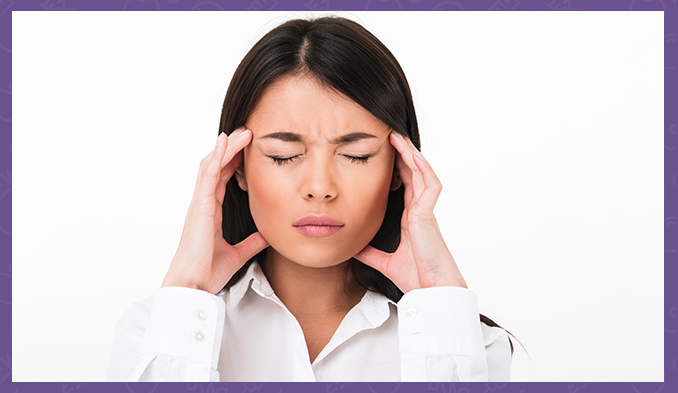Do we often suffer from headaches? Do we know what is a signal that we should consult a doctor?
If you find yourself in any of the following lines, you probably need the opinion of a specialist.
When we feel that we have a headache, it is often perceived as a complaint of a general nature. But is it really? What could be behind frequent headaches and should we be worried about our health.
While some types of headaches can be painful and debilitating, the majority of headache types can be treated with familiar painkillers and disappear within a few hours. However, it's important to know that frequent recurring "attacks" or certain types of headaches can also be a sign of something more serious!
The International Classification of Headache Disorders - ICHD, defines over 150 different types of headaches, but in general they all fall into 2 main categories: primary and secondary.
SECONDARY HEADACHE
The second main group we will focus on is that of Secondary Headaches. These are a secondary symptom of injury or other illness.
Headache from excessive intake of medication
(Medication-overuse headaches - MOH) - sometimes known as rebound headaches - is the most common type of secondary headache. It features frequent or daily headaches with symptoms similar to those of tension headaches or migraines. These headaches initially respond to painkillers but then reappear later. MOH can result from taking painkillers more than 15 days a month.
Medications that can cause this type of headache include:
- Opioids
- NSAIDs such as aspirin and ibuprofen
- and many others
MOH can still occur even though you are taking these medications as directed. But this headache seems to develop mainly in people taking painkillers specifically to treat headaches.
The only treatment for this condition is to stop taking the medication for the headache. Anyone who stops medication should do so under the supervision of a doctor. The doctor will be able to help by working out another plan of action or prescribing other medications to ease the stopping process.
Symptoms are likely to get worse before improving after stopping the medication. Headaches usually stop within 10 days. Additional symptoms on stopping usually resolve within 7 days but may take up to 3 weeks.
These include:
- nausea and vomiting
- increased heart rate
- sleep disorder
- restlessness, anxiety and nervousness for up to 3 weeks.
Most people return to their original headache pattern within 2 months. After that, it should now be safe to start taking pain relief medication again.
The following steps can help prevent MOH: avoiding codeine use, taking painkillers for headaches but no more than 2 days a week, using preventive medications for chronic migraine.
Sinus headache
Sinus headaches are caused by sinusitis - swelling of the sinuses, which is usually the result of an infection or allergy. Symptoms consist of a dull, throbbing pain around the eyes, cheeks and forehead. The pain may worsen with movement or straining and can sometimes spread to the teeth and jaw.
These headaches are usually accompanied by a thick green or yellow nasal discharge.
- Other symptoms may include:
- stuffy nose
- temperature
- Nausea
- sensitivity to light or sound
Sinus headache is quite rare. If there are no nasal symptoms, a headache of this nature is more likely to be a migraine.
A doctor may prescribe antibiotics if they think a bacterial infection has caused the headache, or antihistamines in the case of an allergy. Doctors may also prescribe a corticosteroid nasal spray to help reduce swelling.
To diagnose the underlying cause of sinusitis, the doctor may refer the individual to an ear, nose and throat specialist.
Caffeine-related headache
Increased caffeine consumption - more than 400 milligrams (mg) or about 4 cups of coffee - can sometimes lead to headaches. In people who consume more than 200 mg of caffeine daily for more than 2 weeks, stopping can lead to migraine-like headaches. It usually develops within up to 24 hours after abruptly stopping caffeine.
Other possible symptoms include:
- fatigue
- difficult concentration
- Irritability
- Nausea
Symptoms are often relieved within an hour of taking caffeine, or will subside completely within 7 days of giving up caffeine completely.
The effect of caffeine varies from person to person, but reducing your intake can reduce the risk of headaches. Limiting caffeine consumption is sometimes recommended for people who have chronic migraines.
Headache in head injuries/trauma
Anyone experiencing persistent or worsening headaches should see a doctor.
Always call an ambulance for serious head injuries, or if someone is experiencing the following symptoms after any head injury:
- unconscious
- Seizures
- Vomiting
- memory loss
- Confusion
- vision or hearing problems
Post-traumatic headaches can develop months after the initial head injury, making diagnosis difficult.
Most headaches are rarely a sign of something more serious and most people can manage them effectively with painkillers. However, anyone experiencing severe, persistent, recurrent or worsening headaches should consult a doctor.
Medical attention should be sought immediately for headaches:
- which appears suddenly and is extremely painful
- which recurs in children
- after a serious blow to the head
- associated with confusion or impaired vision, coordination or speech
- associated with numbness or weakness
- associated with fever, convulsions or unconsciousness
- accompanied by a stiff neck or rash
- associated with constant vomiting
For more information, we at Medical Karaj are at your service.
Call us on the following numbers "Medical Karaj": 0879 977 401 or 0879 977 402.
Also keep an eye on our constantly updated Facebook content.



